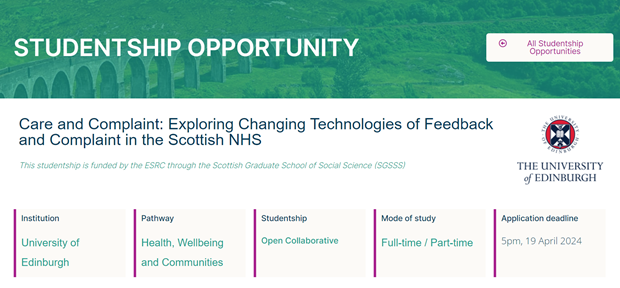
Over the years since Care Opinion started, we have been asked one question on many occasions: does online feedback reduce the number of formal complaints made?
This is an interesting and worthwhile question, presumably prompted by the idea that offering an alternative route for resolving less serious concerns might mean that those issues don’t escalate into a more serious complaint. Sadly, despite some anecdotal evidence, we still don’t have a definitive answer to this question.
But this isn’t the only question worth asking about how online feedback and complaints interact. Indeed, there are all kinds of questions to explore in this space.
For example:
- How do people choose between posting online feedback or making a formal complaint?
- Do some online stories then become formal complaints, and why? Conversely, do some complaints also become online stories?
- In what ways is the experience of posting an issue on Care Opinion similar to, or different from, that of making a complaint? Are those raising concerns more or less likely to achieve their goals via one route or the other?
- From a staff perspective, how do these routes compare? Are staff more or less likely to respond to, learn from, or act on online feedback or complaint?
- Does familiarity with responding to Care Opinion feedback have any effect on how staff feel about or respond to formal complaints?
- How are people raising concerns advised by staff? Are some directed towards the complaints process, while others are directed to Care Opinion?
- What are the implications of these different channels for longer term culture change, or for relationships between patients and staff?
These questions are not just academic curiosities. Complaints policy and practice in healthcare has been a vexed issue over many years, with ongoing debates about the purposes of complaint, the defensiveness of healthcare organisations, and how the system can be improved in practice.
Understanding the relative roles of online feedback and complaint could have a significant effect on policy.
So in this context it is very exciting that Edinburgh University, in collaboration with Care Opinion, is supporting a new PhD studentship which will take a wide-ranging approach to studying and illuminating some of these issues. The academic supervisors are Fadhila Mazanderani and Cath Montgomery, both of who have published influential research on online patient feedback.
The studentship is open for applications until 19 April 2024 so if you know anyone who might be interested, do let them know!
New PhD studentship: Exploring changing technologies of feedback and complaint
New PhD studentship: Exploring changing technologies of feedback and complaint https://www.careopinion.org.uk/resources/blog-resources/1-images/d26b21e8a6244d4585fc4fd1f7eab54f.png Care Opinion 0114 281 6256 https://www.careopinion.org.uk /content/uk/logos/co-header-logo-2020-default.pngUpdate from Care Opinion
Posted by James Munro, Director of Research & Development, Care Opinion, on
Thanks for your feedback.

